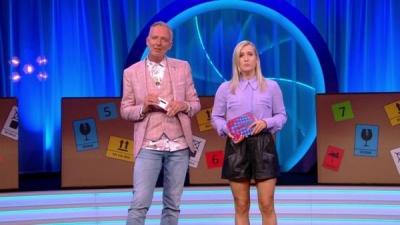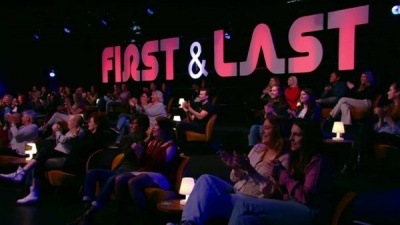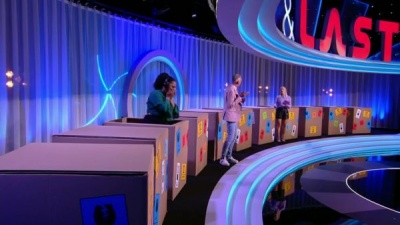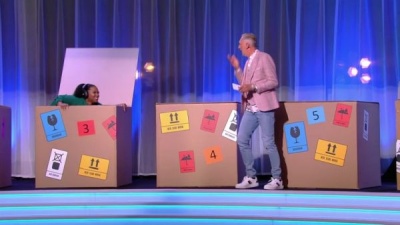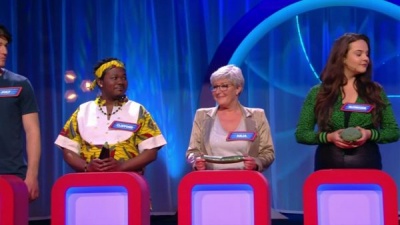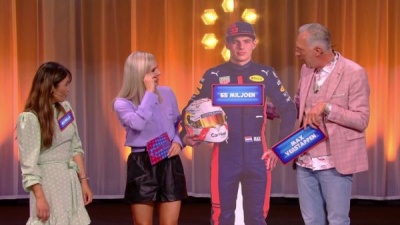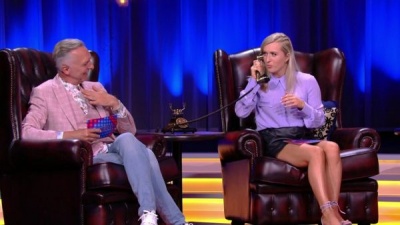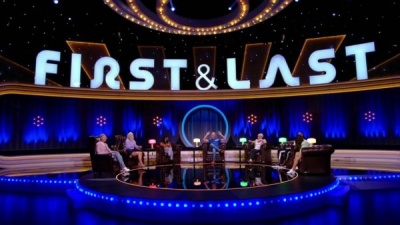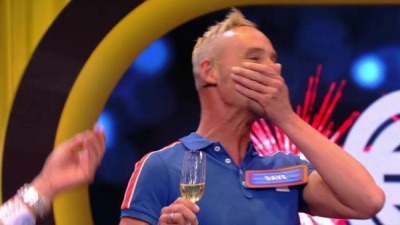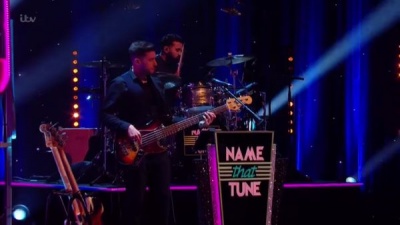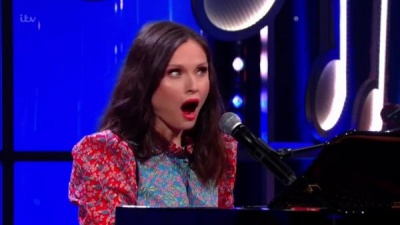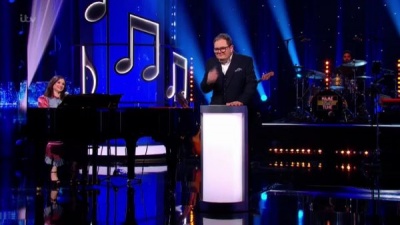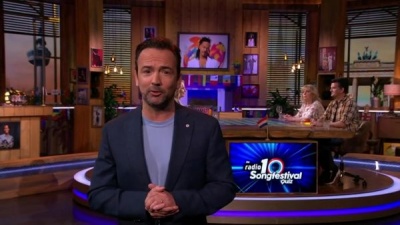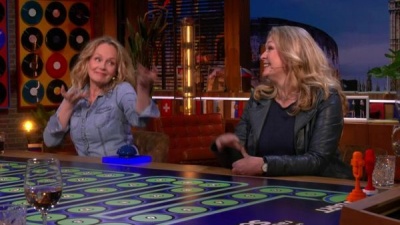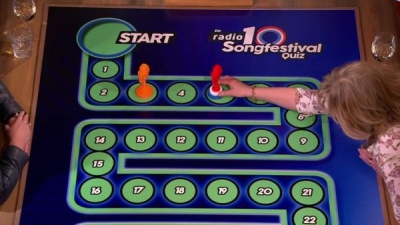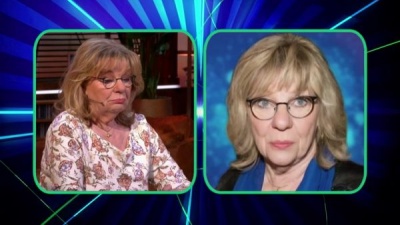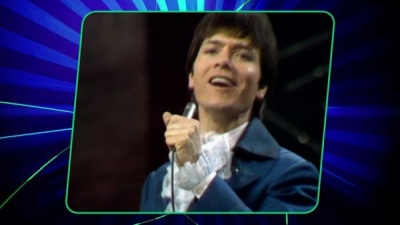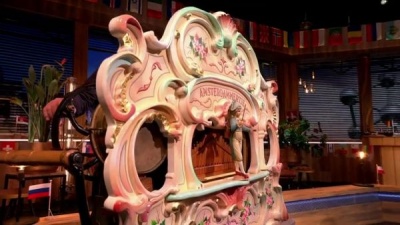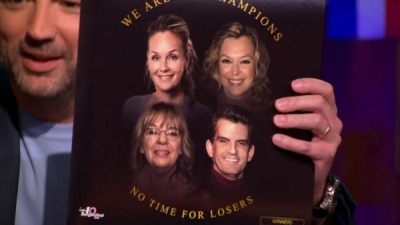Weaver's Week 2021-05-16
Last week | Weaver's Week Index | Next week
As a preview to next week's Eurovision song festival, we had hoped to talk about three Dutch shows this week. Unfortunately, we haven't been able to get more than halfway through De Verraders – our Dutch might be good, but not quite good enough for a subtle game of deduction. We will keep at it, and hope to report later in the summer.
So let's have something we'll all find a bit more familiar.
Contents |
First & Last
EndemolShine Nederland (een part van Banijay) for SBS6, from 23 April
Remember the show with Jason Manford and lots of people in cardboard boxes? Popular Saturday night entertainment a few years ago, in 2020. It's back, though only for viewers who get Dutch television.
What's changed in translation from English to Dutch? And what's changed with the recent health crisis?
The biggest and most obvious change? Two hosts. While the BBC version had the inimitable Jason Manford, Dutch viewers get Martien Meiland and Britt Dekker. Who are these people? Well, Jason Manford is a comedian from Salford... oh, you knew that.
Martien Meiland is an interior designer and presenter. He became famous from a fly-on-the-wall documentary about his new life converting a castle into a bed and breakfast hotel. Other presenting opportunities followed for the flamboyant man, including lottery tie-in Bingo! De 100.000 Euro Quiz ("Bingo! The £90,000 Quiz") and their version of The Bidding Room, known as Cash or Trash ("Cash or Trash". Cor, Dutch is easy!)
Britt Dekker rose to fame on a rival channel's Take Me Out, and she became a famous face on other RTL programmes. After about ten years, she jumped ship to Talpa's SBS6 channel. This is quite common in Dutch television, they have a lot more "golden handcuff" contracts than the BBC or ITV. There are faces of public broadcaster NPO, faces of commercial channel RTL, faces of rival Talpa-SBS, and they only get together for huge shows like Wie is de Mol?.
So, two hosts introduce the show. There's an audience for the show, about fifty people seated in small groups on comfortable sofas, all at a good distance. Because the Dutch government cares for its subjects, and listens carefully to the science, there's been far less of a problem with the you-know-what than over here. Nevertheless, a caption at the start of the show tells us that all participants – and the hosts – have returned a negative test.
Positively, the show begins with all the contestants in a cardboard box. The hosts deliver their scripted remarks. And it's so much better when there's someone to bounce off, Britt and Martien can exchange one-liners. Jason's monologues were fun and witty, but it always felt strange to start a show with Jason all alone.
Soon enough, one of the contestants jumps out of their box. Cheers and aws in equal measure, because the first person is out. The others arrive, and we finally work out who will be last. The first and last are eliminated from the game, before we get to know them.
Next up, it's "Wat Weegt Het", the Incredible Weighing A Vegetable You've Brought From Home Round. Upgraded from a mere Interlude, this round now eliminates the player with the heaviest and the lightest courgette. Vwoomph, just like that, eleven have come down to seven, and we barely knew them.
The Picking an Answer Round comes next. That's the one where our players are to pick one option from seven available, and hope they've avoided the most and least in the category – in the sample episodes we've seen, how much money a celeb is said to be worth. As the round progresses, we finally get to learn more about the players. What's the name, where are they from, what anecdote can they tell about the time they were caught in a lift with their cardigan unbuttoned. (Or something like that: this column's Dutch isn't perfect.)
Towards the end of the round comes something unusual for First & Last, an advert break. SBS6 is a commercial channel, and it will air commercials in the middle of their shows. Don't get this on the BBC.
Was there something else on the BBC's version? Yes, the world's greatest supercomputer, the J-MAC. They've streamlined the show, and replaced this elimination with one from the vegetables. In our view, it makes for a better show: although we've two fewer contestants to meet, it means we can spend a bit longer with the ones we do know. And it saves up some time for the next round...
"Met wie spreek ik?" The Round Where You're Friend's on the Phone comes next, the remaining five players call someone up and ask their friend to call the studio. First to call is out, last to call is out.
This is where First & Last works really well. We're all just sitting around. Waiting for a call. Waiting for the phone to ring. We're all sat in those plush leather chairs: they look comfortable, but they're not. On tenterhooks, hoping that the phone will ring. Hoping that it'll be someone else's mother on the other end of the line.
And then, when the first player is out, the tension continues. Now we want our friend to call. Not in two minutes, not in one minute. Now. Martien and Britt answer the phone, and make a lot out of saying very little. It's a masterclass in tension. They almost don't need to cut to a commercial break while talking to the last caller: they know we'll be back.
Finally, it's The Round Where They Name Their Own Prize Finale. You know how this works: each player names their own prize, whoever goes in the middle is the winner, and wins the sum they named. In the shows we've seen, about €18.000 (€18,000, £16,000). And they celebrate with a glass of fizzy wine, something else you wouldn't get on the BBC.
Of all the things, we're getting a hint of The Generation Game in its late 70s pomp. Martien comes across in the Larry Grayson style: a bit camp, pretending to be a bit rubbish while actually being very sharp. Britt is the straight act, keeps the show ploughing ahead even while Martien gads about. Martien isn't a trained television presenter, and his natural exuberance gels well with this Big Dumb Show.
A new series is in production for the BBC. We'll be interested to see how it compares. The same show every week can be samey, so we still hope they've come up with one more brilliant idea. Even if it's as simple as "power down the J-MAC".
Alan Carr's Epic Game Show
Talkback (a Fremantle label) for ITV, from 3 April
Last year, we tried to be positive about Epic Game Show, not least because it had cheered up a lot of people at a difficult time. With life becoming a little less uncertain, what can we make of the second run? There's no audience, and Perspex screens between contestants, and Alan doesn't reach in for hugs, but that can only be expected.
The series opened over Easter weekend with Celebrity Play Your Cards Right, a near-photocopy of the show from last year. Alan's pre-title shout to the audience has gone, but it's otherwise the same format with different players – and the same result.
Civilian Bullseye followed, and left us thinking: this first segment just sags. The category board needs a host with a little gravitas, someone who at least sounds like he knows what he's talking about. Alan Carr is not that host, and the whole segment floundered badly.
A civilian episode of The Price is Right came next, we were particularly interested to see how the show changed without an audience. Four of the five main games were repeated from last year – including the most iconic three "Cliffhanger", "Hole in One", and "Plinko". Contestants trusted their own instincts, and didn't feel like they had to listen to people in the audience – and tended to be more accurate in their guesses. The final showcase reveal is still far too confusing.
Double! Yello! Céline Dion! Pierro and the Tweenies!
Next came the new show, Name That Tune. We've four memories of the early-80s original, and it's not a huge surprise that Maggie Moone was unable to join us. Melody Roulette was the traditional starter, spinning one wheel to find out how much the song's worth, and another to find out whether we can "Double! Double!" that amount.
Any sign of Melody Roulette here? Not a sausage. Instead, we get "Quickfire Hits", suspiciously like the First Round Proper on BBC1's The Hit List, with contestants buzzing in to name hit singles. OK, here they're being performed by the Name That Tune house band, and feature live vocals, but it's the same basic idea. First three players to name three songs correctly advance, the last person leaves the show before the commercial break.
"Wall of Sound" increases the comparisons with The Hit List. It offers more money for songs named quickly, and asks the contestants to pick from broad categories. Whoever's got the least money after two selections each leaves the show. Then we're into "Bid a Note", Alan gives unsubtle clues to hit songs, and contestants try to bid each other down to name the tune in a few notes. Here, the clues are too obvious, and guest pianist Sophie Ellis Bextor could have been replaced by a pianola reel.
Finally, the "Golden Medley" is present and correct – name seven tunes in 30 seconds of music to win the game. This would be a properly tense finish, except that the show doesn't have the depth of The Hit List. Every song is a "No Wow Oldie" – we hear it on the radio and we're not surprised at all. The Hit List jumps around from massive hits ("Black magic" by Little Mix, a number 1 seller and played 554 times on radio in the last fortnight) to minor hits ("Magic fly" by Space, a number 2 hit and played 72 times), to hits forgotten even by the people who made them ("Magic touch" by Loose Ends, a top 20 hit and played 8 times).
The Hit List rewards people for having a deep musical knowledge. Name That Tune used to reward people for having a deep knowledge. Now, it rewards people who are quick on the buzzer in round 1, and can solve some facile clues.
Strike it Lucky featured six Black contestants, including the winners who stopped as soon as they'd won a decent prize. The endgame remains fatally flawed, and almost unwinnable. Every prize on the series can be won, except the top prizes on Strike it Lucky. Finally, Celebrity Bullseye and Celebrity Name That Tune repeated the established formats, for good or ill.
We said last year that Epic Game Show wasn't made for us, it's made for a mass audience. The problem: this year's series hasn't achieved a mass audience. Viewing figures have been modest and moderate, it looks like last year's good figures were a reflection of the very limited alternatives.
There is still some mileage in the idea – Play Your Cards Right works more than it fails, Take Your Pick will play to Alan's strengths when it airs, and Name That Tune can be redeemed. But increasingly, Epic Game Show has felt like a chore to watch, it's work and not entertainment. And there are better things we could be doing.
De Radio 10 Songfestival Quiz
Talpa TV for SBS6, from 1 May
A quiz about the forthcoming Eurovisie Songfeest, for instance. Gerard Ekdom is the host, a man who won't quite remember "Ding-a-dong" winning. On this episode, he's joined by two pairs of contestants.
Playing in red and blue, it's contest singer Esther Hart and Marlayne Sahupala. We're reminded of their songs – "One more night" in 2003, and "Give me one good reason" in 1999. Though NOS and AVROTROS have the rights to the shows, they're happy to sell clips to other broadcasters. We're not relying on blockyvision surreptitiously downloaded from the interwebs, like on lesser channels.
Playing in orange, it's Getty Kaspers and Maurice Wijnen. Getty certainly does remember "Ding-a-dong" winning, seeing as how she was the lead singer with the performers Teach-In. Maurice is a singer, dancer, and music producer. Domestic equivalents of this panel? Gina G and Jade Ewen against Cheryl Baker and Louis Walsh, hosted by Scott Mills.
The show is sponsored by Radio 10. Like the television channel SBS6, it's owned by the Talpa media group. The station's music is oldies, mostly from the late 70s to the recent past. Think BBC Radio 2, only without fewer current hits. Radio 10 has no long talky features (no Steve Wright in the Afternoon! No The Jeremy Vine Witterthon! But no Popmaster) and it's a station this column listens to a whole lot.
But we digress. The object is very simple, the first team to score 50 points wins. Scores are kept in a novel and unusual way: by moving microphones on a board. It fills the space between the teams, and it's long enough to ensure that everyone has to keep the relevant 1,5 metres from each other. They're keeping safe from ballistic projectiles, and it looks even more natural than on Lightning.
Every year on the Eurovision Song Contest, there's someone who cannot sing for toffee. This year, it's Adrian from New York, who will sing along to some classic entries representing NOS. It's a local quiz for local people, and all of these songs will have been on Nu! Dat is wat ik Eurovisiehits genoemen! – though not on its English-language equivalent. A point for each song, a point for remembering who sung it better on the night.
A quick round of "Name That Tune", interrupt the introductions to some other hits. Then each team is asked to know their festival history, they're asked to spot which of two claims is true. Did Corry Brokken win in 1956, or were the jury allowed to vote for their own songs? Points are awarded for each correct answer, and the microphones move down the board.
Here's a slice of genius: the contestants have been digitally manipulated, and appear to be singing along to some Eurovision classics. When they've got over the shock of this clip, they're asked for the song, performer, and land they're singing along with. Getty appears to be clucking along with "Toy" in a clip they'd love to go viral.
Next, it's the translation round. Gerard will read out the lyric to a classic song, except it's been translated from English into Nederlands, or vice versa. See, you just wouldn't catch Scott Mills doing this in a flawless pair of accents. "Gefeliciteerd. En vieringen. Als ik iedereen vertel dat je verliefd bent."
De Songfestival Quiz is done in a very relaxed style, participants have brought wine and spirits onto the set. Don't get that on shows over here, even Paul Sinha's TV Showdown was a sober performance. Around the set are various performers from the contest, with a big picture of home hope Jeangu Mcrooy looking down over the host. Out of the window, we see various bits of European culture – the Atomium, Brandenberger Tör, the Colosseum. Little details to keep us in the show's world.
It's the Put Three Things in Order Round next. Which of these things was the bigger hit, or came first. All done very quickly, because there's not a lot they can talk about with three options.
Another piece of local culture: Fabian and the Draaiorgel. It plays music from punched cards, and – if cranked at the right tempo – might give a vaguely recognisable rendition of "Hallelujah" (Milk and Honey's one, not Lordi's). Our hypothetical BBC version would feature the local ice cream van, Mr. Whippy's Organ.
One final piece of genius as we head into the final round: the value of each question will be decided by rolling dice. The leaders get a gold dice, with values from 3 to 6; the losers get a white dice, with values from 3 to 5. The losers go first. We spend about ten minutes on this final section, general questions about the contest, before someone crosses the finish line to be the winner. Special picture discs for the winners, alarm clocks for the losers to join Gerard on the Radio 10 morning show.
We found De Songfestival Quiz to be a fun and entertaining watch, and that's only partly because we translated "Congratulations" back to English before the teams. The clips were more wide-ranging than we'd expect from the BBC, showcasing Cascada as well as Lena, they gave us "Volare" but not "Waterloo". It's an entertaining little parlour game, with some variety and unexpected twists on the journey – even if the winners were apparent from the opening moments.
In other news
A question from a reader: have they lost an episode of Tenable down the back of an ITV sofa? They've commissioned 50 episodes, aired 25 hosted by Warwick Davis, 24 with Sally Lindsay, and a repeat to make up the week. Was the last episode the special they aired at Christmas? Or has it vanished into the ether? Enquiring minds are enquiring.
They're going to have another go at the Great Americanovision Song Contest, based on the Eurovision Song Contest. The show will feature live performances representing 56 states, provinces, and territories. NBC will make the show next year, and it looks like there will be pre-qualifiers, a semi-final, and a grand final. No word yet on whether there's an automatic place in the final for the Big Five (California, Texas, Alaska, New York, and Georgia).
Domestically, it's the final week of Great Local Menu (BBC2, from Mon), and the grand finals of Taskmaster (C4, Thu) and Brightest Celebrity Family (ITV, Thu).
But the week's big highlight: it's Eurovision Song Contest week! Tuesday and Thursday's semi-finals are on RTÉ2 and BBC4, with radio commentary on RTÉ Radio 1. Worldwide, we reckon the Dutch international service bvn.tv has a good shot, or Youtube in most places (but not the UK or US). Tumblr and Twitter will doubtless have a firehose of things to say. There's a whole host of fan sites and drop-in commentaries, and this column will be contributing to Quizzy Dan's gentle gathering.
You have options to enjoy Eurovision: whatever you choose, we hope you enjoy the show. The next Week will be out by Saturday lunchtime, after the semi-final but before the final.
Photo credits: EndemolShine Nederland, Thames (a Fremantle label), Talpa TV.
To have Weaver's Week emailed to you on publication day, receive our exclusive TV roundup of the game shows in the week ahead, and chat to other ukgameshows.com readers, sign up to our Google Group.


